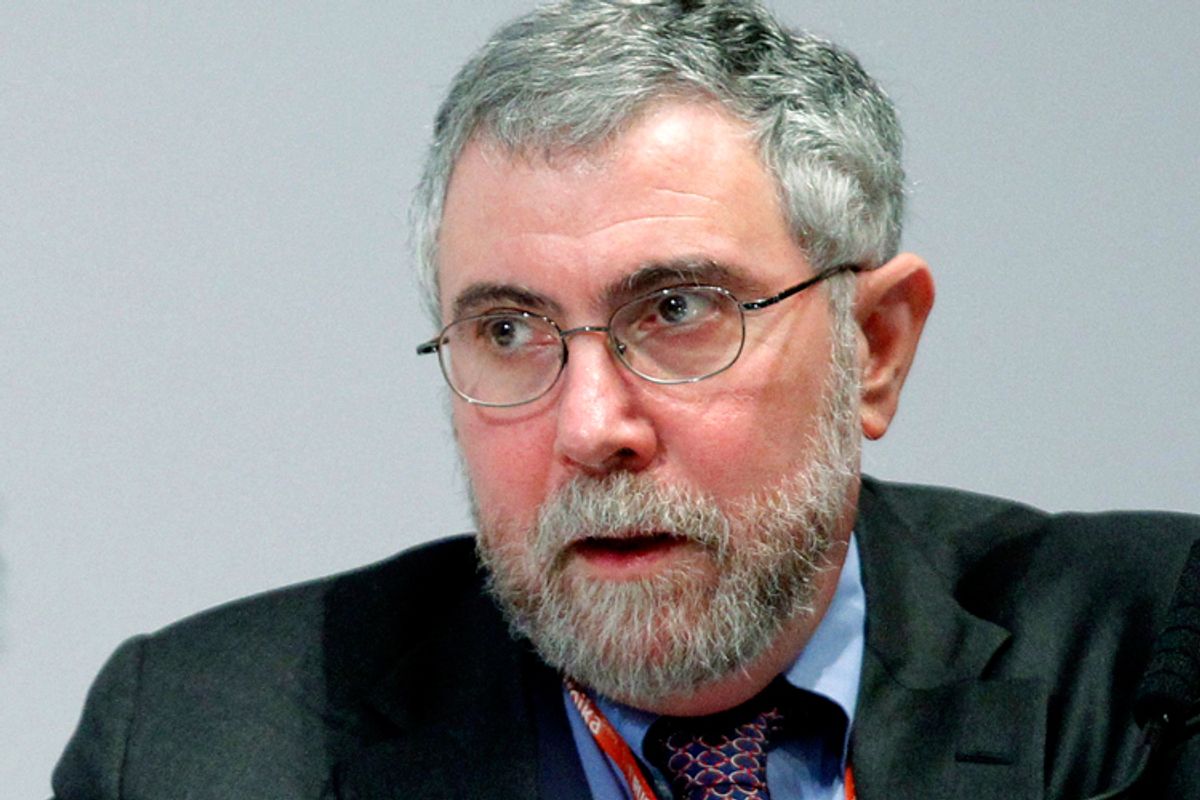The Labor Department confounded forecasters on Friday when it reported that U.S. employers added 321,000 jobs in November, while average wages rose a better-than-expected 0.4 percent. Aside from a quick hiring spree for the 2010 Census, it was the best jobs report since the 2008 meltdown. We aren't quite out of the woods yet, but this is what a real recovery looks like.
According to Nobel Prize-winning economist and New York Times columnist Paul Krugman, last week's good news debunks the right's favorite shibboleths about the Obama-era economy. In today's column, Krugman argues that while long-term unemployment remains at historic highs and the economy's growth potential has diminished over the past seven years, President Obama's policies aren't at fault.
First, "postmodern recessions" that occur after bubbles burst -- including the recessions of 2001 and 2007-2009 -- take longer to end, Krugman notes. The Federal Reserve deliberately engineered the 1982-1984 recession by raising interest rates, operating on the theory that Americans needed to endure temporary pain to combat inflation. Once the Fed brought rates back down, the economy recovered. In postmodern recessions, by contrast, monetary policy can only do so much to spur recovery.
To be sure, policymakers could have done more to hasten the recovery from the Great Recession. A larger stimulus, Krugman contends, would have generated more hiring and put more money in the hands of families who would then spend it, creating a virtuous circle. Moreover, after taking over the House of Representatives in 2010, Tea Party Republicans forced draconian cuts in government spending, further hindering a full recovery.
So big, bad government didn't hold the economy back. Indeed, more government spending would have lifted America's fortunes, and drastic cuts in government jobs helped keep unemployment higher than it would have been without austerity.
Conservatives are also fond of the argument that the recovery has been slow because Obama has been mean to the private sector, as when he called Wall Street bankers "fat cats." Such rhetoric, they argue, undermines "confidence" and discourages employers from hiring and making big investments. But, Krugman reminds us, private sector job growth has been more robust under Obama than it was under George W. Bush, hardly an foe of corporate America.
What about Obamacare, which House Speaker John Boehner once described as "the biggest job-killer we have in America today"? Well, job growth has accelerated in the past year, just as the Affordable Care Act has gone into full effect. It appears that employers missed Boehner's memo.
The sad irony, Krugman concludes, is that while Republican obstructionism and austerity have damaged the country's economic prospects, the GOP has been "richly rewarded" for its obstruction at the ballot box:
Just to be clear, I’m not calling the Obama-era economy a success story. We needed faster job growth this time around than under Mr. Bush, because the recession was deeper, and unemployment stayed far too high for far too long. But we can now say with confidence that the recovery’s weakness had nothing to do with Mr. Obama’s (falsely) alleged anti-business slant. What it reflected, instead, was the damage done by government paralysis — paralysis that has, alas, richly rewarded the very politicians who caused it.



Shares